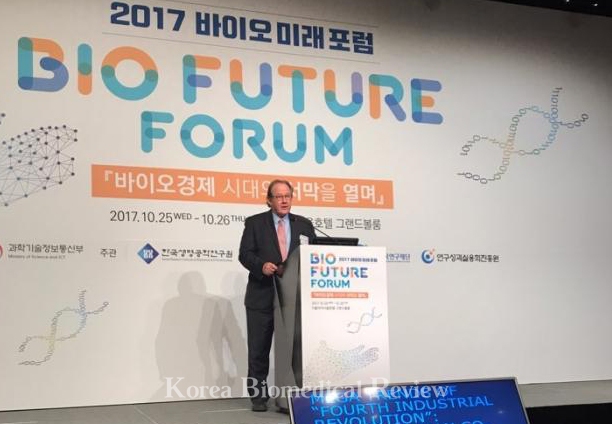The 2017 Bio Future Forum opened its third annual conference to discuss the coming of the bio-economy era, on Monday.
Korean and foreign institutions and businesses related to biotechnology, including IBM and Ceres Nanosciences, shared the examples of countries responding to the bio-economic era and talked about research and development innovation to become a global leader in developing the technology.
The forum focused on two primary topics -- the arrival of the bio-economy era and challenges to becoming a bio-economy powerhouse. The first day of the session focused on the advent of the bio-economy era.

John. H. Clippinger, a research scientist at the MIT Media Lab, made a presentation regarding the trends in the bio-economic era and the Fourth Industrial Revolution. “The word ‘industrial’ in the fourth industrial revolution is a misnomer,” Clippinger said. “Unlike previous industrial revolution, the Fourth Industrial Revolution is a non-mechanical, non-market-based, and non-material revolution.”
It is rather an ecological evolution focused on the biological—living—decentralized autonomous network, Clippinger noted.
“The Fourth Industrial Revolution is driven by convergence and transgression,” Clippinger added. “This will result in atoms changing into qubits, a unit of quantum information, which will blur the lines between the physical and digital.”
Clippinger pointed out that such cases are already being used in the field such as robotics and biology. “Nanobots and CRISPR genome editing technology are case examples of the transformation,” Clippinger added. “In the end, everything will be virtualized and verified with the rapid transition changing to a sustainable and decentralized economy.”
Andrew Chang 장화진, CEO of IBM Korea, talked about Watson, the company’s artificial intelligence, and its impact on digital revolution and bio-economy
“Dealing with huge data and utilizing the vast amount of digitized knowledge has become impossible with human cognitive abilities and has also reached its limit in the old conventional methods,” Chang said.
Already various industrial sectors have applied AI to prove its value, including the healthcare industry, Chang noted.
“Approximately 150 exabytes, which converts to 15 million terabytes, of healthcare data exist and is unorganized, making it impossible for humans to utilize the raw data,” Chang said. “AI’s role is to sort through the data all provide useable data.”
Especially, Watson is helping oncologists prescribe cancer treatment, which is the most threatening disease in a healthy life and is expensive to treat, Chang said.
Im Dae-shik 임대식, director of Science Technology Innovation Division 과학기술혁신본부장 at the Ministry of Science and ICT 과학기술정보통신부 , summed up the conference's goal: “Biotechnology is Korea’s core strategy that will create new industries, provide high-quality jobs and lead innovation growth. The conference will share bio-related strategies in major countries and discuss key strategies to cope with the arrival of the bio-economic era.”

